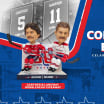Changing The Game
To one local family, the introduction of the Capitals' new initiative ALL CAPS ALL HER is especially meaningful
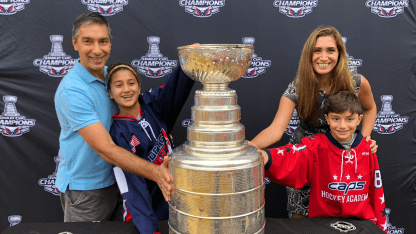
ALL CAPS ALL HER will work to recognize and support female players, coaches, referees, parents, advocates, students and leaders in the community. Additionally, ALL CAPS ALL HER will sponsor events, programs and content that will provide varying levels of entry into hockey for women and girls of all ages, offer leadership, business development, and networking opportunities and highlight influential women and families in the hockey community.
To one local family, the introduction of ALL CAPS ALL HER is especially meaningful. Prompted by her brother Mejd's experience playing hockey at MedStar Capitals Iceplex, Meena Al-Kadiri decided to pursue hockey in 2017 after a few years of figure skating. Given the lack of girls participating in her son's hockey league, and her own experiences as a child, Meena's mother Mais Abousy was understandably skeptical when her daughter approached her about playing hockey. But her father, Mohammed Al-Kadiri, took the helm and signed her up for the Capitals Learn To Play program at MedStar Capitals Iceplex. Five years and hundreds of games later, Mais and Mohammed couldn't imagine their lives without hockey.
Making a Difference Through Sport
Meena and Mais' seemingly improbable hockey journey began not within the ice rinks of northern Virginia, but rather 30 years before and thousands of miles away in Baghdad, Iraq.
Mais and her family left their native Iraq on one of the final planes to depart the capital at the onset of the first Gulf War in 1991. Like many young girls in Iraq, Mais had little opportunity to participate in sports. The lone daughter in a traditional Iraqi family, Mais had no knowledge of sports other than the reality that they were meant only for boys. In fact, Mais was not introduced to formal sports until her sophomore year of high school, when she briefly played on her school's volleyball team. At the time, her parents did not encourage her to pursue athletics, but to instead focus on her education.
Following high school, Mais enrolled at George Mason University where she studied Economics and Political Science. Through her early days as an undergraduate, Mais continued to focus solely on her studies, until one day she came across the school's gymnasium. Initially, Mais did not fully understand why people would spend time exercising for leisure.
"I remember thinking," Mais said, "'Why would you go to the gym? Must be a fad.'"
However, her perspective on sports changed once she noticed that not just men, but also women, were also taking advantage of the facilities. For the first time, Mais recognized women of all races and ethnicities do participate in sports for fun.
After graduating from George Mason, Mais received her law degree from American University's Washington College of Law. It was during this time that Mais starting actively running. Despite her newfound interest in athletics, Mais' parents' skepticism persisted.
"Their very first question was," Mais said, "'Why are you running? Who are you running from?'"
Although her parents did not fully comprehend her new interests, Mais continued to train through law school as a way to relieve stress and remain active.
Things changed for Mais during the 2013 government shutdown. Unable to work as a government attorney, she devoted more time to running and has since completed over 3 marathons and over 20 running races, including the New York City Marathon and the Nation's Triathlon.
One experience in particular made it clear to Mais that she had a calling to racing.
During a work trip in her home country of Iraq, Mais found herself in Baghdad as ISIS forces were just 30 miles away, closing in on the city.
In a strange twist of fate, a promotional video for the upcoming 2017 70.3 Ironman Miami triathlon appeared on her phone and asked a poignant question: "Do you want to change the game?"
To Mais, this was a sign that she could make a difference in her community.
"I was surrounded by such hopelessness," Mais recalled. "And if I can be a game-changer through sports and show people it's possible to do something if they focus and if they take it step-by-step, I had to. Even in the midst of bullets and bombs, if you have a dream and have a resilient persistence towards it, it is possible."
Since then, Mais has completed over a dozen triathlons, from sprint to full Iron distance races, raising the U.S. and Iraqi flag.
At the time, Mais felt that sports were the perfect avenue to pursue her life's mission: to be a bridge between the United States and Iraq and help develop better relations through the countries' children.
New Perspectives
Since having their two children, Mais and her husband have worked tirelessly to provide them with the opportunities that they were not afforded in the past. That is why Mais was bewildered by her own apprehension when Meena first approached her about playing hockey.
"Hockey itself was a new sport. I didn't see any girls on other teams, and I was very taken aback," Mais remembered. "All the players were boys, all the coaches were men, and I wasn't very comfortable."
Looking back, Mais recalls being surprised that she responded in same way her own mother had reacted upon finding out she was involved in athletics. After meeting a number of Meena's coaches and witnessing the diversity of the local programs, many of Mais' initial concerns were quickly alleviated.
Unlike many other sports, hockey has remained overwhelmingly homogenous throughout its history. Locally, however, the Capitals and youth hockey organizations have made great strides in improving accessibility and opportunity for families like the Al-Kadiri's. Mais points out that the diversity of Mejd's and Meena's teams, both in race and gender, played a vital role in assuaging her concerns.
Mais is thrilled that the ALL CAPS ALL HER program will continue to enhance opportunities for young girls of all backgrounds to join the hockey community that means so much to her family.
Mais points out, "If a young girl walks into MedStar and sees other people like her playing hockey, it will show her that she is valued and that the sport is an option."
Beyond expanding opportunities on the ice, Mais believes that initiatives like ALL CAPS ALL HER will be integral in expanding the presence of females in the hockey industry.
"While it is great for women to love hockey on the ice," Mais contends, "It is imperative that they have a platform to remain involved in the game after their playing days are over."
Through ALL CAPS ALL HER and the initiative's coach, referee, and business development programs, Meena and thousands of other local female athletes will now have that chance.
Love of the Game
Over the past five years, Meena has progressed through nearly all levels of youth hockey; from the Capitals' Learn to Play program, to the Rooftop Hockey League, and the Capitals Academy travel program. Throughout this time, Meena was typically the only female player on her team, oftentimes competing against all-boys teams. Meena has since blossomed into one of the area's top female players, joining the Tier 1 Washington Pride 14-and-under team last season.
Being the only girl on her team in the past did present Meena with a certain level of adversity, however. This included a sense that she needed to 'prove herself' to her male teammates to gain their respect. Despite those challenges, Meena believes her time spent learning the game as part of a co-ed team, while sometimes difficult, helped prepare her for competition at highest level of girl's youth hockey. Now, Meena looks back fondly on her time as the lone girl and maintains friendships with many of her old teammates.
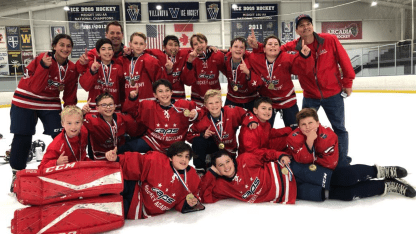
Since her first day donning a hockey jersey, Meena has been fortunate to develop many lasting friendships and even more incredible memories. From scoring her first goal to winning last year's Southeast Division championship to advance to the USA Hockey National tournament, Meena has enjoyed an extraordinary start to her hockey career.
Despite her many successes, one memory stands above the rest. During her very first season of competitive hockey, Meena and her father, unbeknownst to Mais, made a deal that the family would get a dog if she was able to score 10 goals during the season.
As the final seconds of the season's last game approached, Meena needed just one more goal to receive her beloved puppy. With under a minute left in the game, and fans from both sides cheering her on, Meena's teammate and friend Itai passed her the puck for a tap in goal.
While the team still lost that game, that goal sealed the deal, and the Al-Kadiri's now have a four-year-old German Shepard named Max.
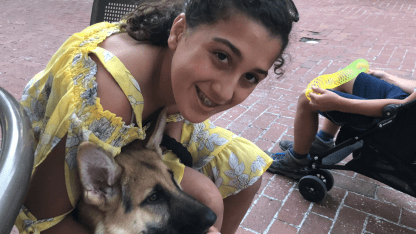
Seeing is Believing
Similarly to young athletes around the country, Meena has many goals and aspirations for her hockey career.
For Meena, hockey first began as a fun recreational activity that she hoped to pursue a couple times a week after school. Given her unmistakable skills, leadership abilities, and knowledge of the game, she soon realized that the game could become more than just an afterschool hobby. Meena aims to play at the highest level of college hockey, and hopes she has the opportunity to fulfill her Olympic dreams.
The dreams shared by Meena and her peers have become much more realistic through the growth of girl's hockey across the United States and the success of the U.S. Women's National team.
Several years ago, Meena had the unique opportunity to meet two of her idols, Monique and Jocelyne Lamoureux, when they visited the MedStar Capitals Iceplex after winning gold at the 2018 Winter Olympics.
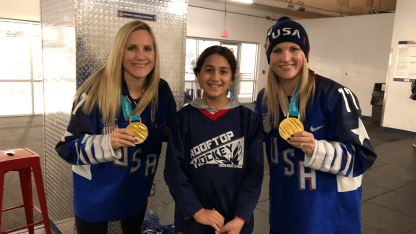
For a young girl like Meena, the chance to meet female Olympians and other events like the D1 in D.C. tournament prove that it is possible to achieve her goals and provides positive female role models in the game.
"I've always focused on watching the NHL," Meena said. "But seeing [female players] have the same platform as the men is so cool. It's like, 'Hey, I can go and do that, I can get a gold medal. Just like Patrick Kane. But not Patrick Kane, for myself.'"
Building a Community
The hockey world is filled with amazing stories of the bonds and friendships created through the game, and the Al-Kadiri's are no exception.
After emigrating to the United States at the age of 10, Mais spent years forming a community among people that looked like her, came from the same place, and shared the same culture. Although she developed important friendships over the years, she has become part of a new community - her hockey "family".
Hockey requires an incredible commitment of time from parents, ranging from tying skates and finding lost equipment to traveling to far-away tournaments. Hockey families rely on one another for help and support. When Mais was training for her latest Iron Man competition, for example, her network of friends and coaches rallied to support the family by driving Meena to games and practices, cooking meals, and providing much-needed encouragement.
Since joining the hockey community, the Al-Kadiri's have developed life-long bonds with families of both Meena's and Mejd's teammates - relationships that will persist long after the kids no longer play together on the ice.
The building of bonds has not been limited to other families; it has also helped bring their own family closer together as well.
"Even though the kids skate three to four times a week," Mais laments sarcastically, "Hockey is always being discussed, watched on T.V., or listened to on the radio."
After games, the family doesn't necessarily discuss specific plays, but rather how they felt about certain interactions or how they dealt with adversity. Because of this, Mais feels that hockey has allowed them to become more involved in each other's lives and more in-tune with each other's emotions. For the Al-Kadiri family and many others, hockey has served to teach many important life lessons.
Coaching is Key
In addition to the family's burgeoning friendships, Meena has also benefited greatly from an indispensable cast of coaches who have encouraged her to further develop and foster her love for the game. Ben Kwon, a McLean native and staple of the Capitals' Learn to Play program, was Meena's first coach. Henry White, who Meena refers to as her 'hockey uncle,' helped Meena flourish during her time playing for the Capitals Academy. Kylie Sennott helped teach Meena the importance of sportsmanship and was instrumental in her transition to the Washington Pride.
Meena's current coach on the Pride, Matt Herr, has been especially impressed with not only her skill as player, but also her commitment and propensity to lead her peers.
"Ever since day one, she's been a leader on the team," Herr said. "Not only vocally, but she's a physical leader with an incredible attitude. Meena is both a great player and a great person. You can tell how much she loves the sport."
Mais is confident that the ALL CAPS ALL HER program will complement the many dedicated coaches who provide exceptional instruction to young players across the Washington area. To Mais, the ability to attract, train, and retain female coaches will be crucial to the growth and prosperity of the next generation of women's hockey.
Changing the Narrative
Meena's grandmother, Dr. Sawsan Abousy, is not new to becoming 'the first.' In fact, Dr. Sawsan is one of the Iraq's very first batch of female graduates to receive her degree in dentistry, and who only recently retired from practicing dentistry at the age of 76. Nevertheless, the prospect of her granddaughter playing ice hockey was something that took time to accept. "Hockey Shmockey" was the term that she used to describe the game, voicing her concerns about Meena and Mejd playing.
It was not until a recent trip to Rochester, New York, that Sawsan and Meena's grandfather Abbas finally began to understand why the game has been so important to Meena. On the very first day of a three-day tournament, Meena's grandmother called Mais with an unexpected update.
"Of all the people," Mais remembers, "My mom called me and said, 'I get it, I understand. This is a wonderful sport. What nice families, what amazing girls.'"
Now, Sawsan is the first person to send pictures of Meena playing hockey or call for updates about her grandchildren's recent games. Mais takes great pride in the fact that her mother has changed her perspective and embraced the game that her children have come to love.
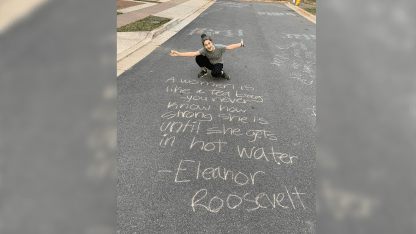
Growing the Game
A tenant of the ALL CAPS ALL HER program focuses on increasing the availability of youth and adult hockey programs for female athletes. For the first time, the Capitals will host an all-girls Learn to Play Program for girls ages 10-14, an all-female adult Learn to Skate series and an adult Learn to Play program for women 18 and older.
The dedicated programs aim to add new players to the growing female hockey population and support current players in the Washington market. According to USA Hockey, there were a total of 2,469 female players (1,740 youth players and 729 adult players) registered in the 2019-20 season, up from 1,932 in the 2015-16 season. This season, the local Chesapeake Bay Hockey League (Tier II) currently has 32 all-girls teams.
Moving forward, the ALL CAPS ALL HER initiative will be instrumental in continuing the growth of female hockey in the Washington, D.C. area.
"The pillars we have created will have a huge impact on the growth of hockey in our market, and we are excited to execute programs that will leave a lasting impression on local girls as they learn more about themselves both as athletes and as members of our community," said Jessie Thompson, Capitals manager of youth hockey development.
To Herr, who is also senior director of youth hockey and industry growth with the NHL, the ALL CAPS ALL HER program is among the most comprehensive in the United States.
"The challenges being undertaken through the ALL CAPS ALL HER program are well documented," said Herr. "Through this program, the Washington Capitals are saying to women everywhere, 'There's a place for you here." Herr continued, "You need to show people of any gender or background that they are a priority, and this program does just that."
Given the all-encompassing scope of the initiative, Herr believes the ALL CAPS ALL HER program has the potential to serve a blueprint for organizations across the NHL hoping to improve opportunities and exposure for female players, coaches, referees, and executives.
As a coach for the Washington Pride 14-and-under team, Herr is also encouraged by the diverse backgrounds represented on his team and other teams in the region.
"I think the team is representative of the changing face of the NHL," Herr points out. "Meena and her teammates are the future face of the NHL, and we have to welcome and embrace them."
For more information on ALL CAPS ALL HER and program registration, visit
WashCaps.com/AllCapsAllHer
.












